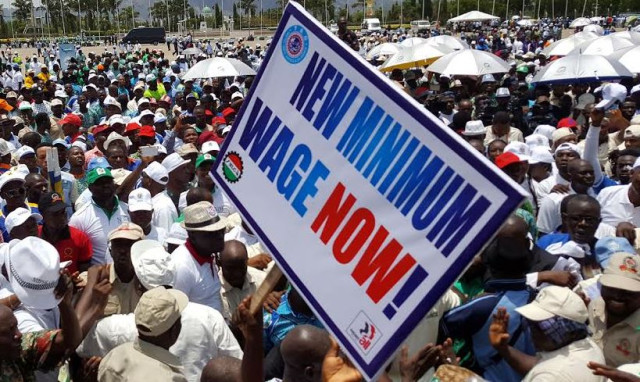The Nigeria Labour on Wednesday exited the national minimum wage discussions after the Federal Government suggested N48,000 per month.
Labour stated that the proposed amount would result in a decrease in salary and is far from being considered a living wage.
Labour emphasized that the proposed sum is significantly lower than the N77,000 that federal-level workers currently earn, which consists of N30,000 as mandated by law, N12,000 peculiar allowance, and N35,000 wage award.
The government's stance was communicated to Labour during a virtual meeting of the tripartite committee on the new minimum wage.
The Nigeria Labour Congress (NLC) and Trade Union Congress of Nigeria (TUC) staged a deadlock in protest.
On January 30, Vice President Kashim Shettima inaugurated a 37-member tripartite committee on a new minimum wage, which includes representatives from the federal and state governments, the private sector, and Labour.
The committee is led by Goni Aji, a former Head of the Civil Service of the Federation. On May Day, President Bola Ahmed Tinubu pledged to provide workers with a decent wage.
The NLC and TUC recommended a salary of N615,000, highlighting the significant cost of living.
In a collective statement released yesterday, Joe Ajaero, President of the NLC, and Tommy Okon, Deputy President of the TUC, expressed that the government's wage offer was "not only a ridicule but also a disrespect to the dignity of workers."
In the recent meeting, the Nigeria Employers’ Consultative Association (NECA) initially claimed that the lowest-paid private sector worker received N78,000, but later proposed N54,000.
Labour expressed disappointment in the government's suggestion of reducing wages rather than increasing them.
In a statement titled "Minimum Wage: government presents wage reduction," the two labour leaders expressed their disappointment in the lack of seriousness from the government in negotiating with Nigerian workers. They stated that despite their efforts, the government and the Organised Private Sector (OPS) did not engage in reasonable negotiation, leading to a breakdown in discussions.
The government's proposal of N48,000 as the minimum wage was criticized for insulting Nigerian workers and falling short of meeting their needs.
In contrast, the OPS initially offered N54,000, although it was noted that even the lowest-paid private sector workers receive N78,000 as stated by the OPS.
This highlighted a significant disparity between the proposed minimum wage and existing standards, indicating a lack of willingness from employers and the government to negotiate a fair national minimum wage for Nigerian workers.
The lack of substantiated data to support the government's offer was also highlighted, undermining the credibility of the negotiation process and eroding trust between the parties involved.
The labour representatives emphasized their inability to accept a wage proposal that would result in a reduction in income for federal-level workers who are already receiving N30,000 as mandated by law, augmented by Buhari’s 40 per cent peculiar allowance.




















